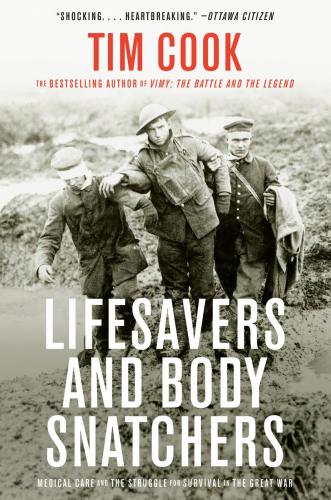Lifesavers & Body Snatchers: Medical Care & The Struggle...
| Item Information | |
|---|---|
| Item#: | 9780735242333 |
| Author | Cook, Tim |
| On Hand | 0 |
From Canada’s top war historian, a definitive medical history of the Great War, illuminating how the carnage of modern battle gave birth to revolutionary—and sometimes shocking—life-saving innovations.
Medical care in almost all armies during the Great War, and especially in the Canadian medical services, was sophisticated and constantly evolving. Vastly more wounded soldiers were saved than lost. Doctors and surgeons prevented disease from decimating armies, confronted ghastly wounds from chemical weapons, remade shattered bodies, and struggled to ease soldiers’ battle-haunted minds. After the war, the hard lessons learned by doctors and nurses were brought back to Canada.
But medical advances were not the only thing brought back from Europe: Lifesavers and Body Snatchers exposes the disturbing story of the harvesting of human body parts in medical units behind the lines. Almost 800 individual body parts were removed from the dead and sent to London, England, where they were stored, treated, and presented in exhibition galleries. After being exhibited there, the body parts were displayed in Canada. This uncovered history has never been told before and is part of the hidden legacy of the medical war.
Based on deep archival research and unpublished letters of soldiers and medical personnel, Lifesavers and Body Snatchers is a powerful narrative, told in Tim Cook’s classic literary style, which reveals how the medical services supported the soldiers at the front and forged a profound legacy in shaping Canadian public health in the decades that followed.
Medical care in almost all armies during the Great War, and especially in the Canadian medical services, was sophisticated and constantly evolving. Vastly more wounded soldiers were saved than lost. Doctors and surgeons prevented disease from decimating armies, confronted ghastly wounds from chemical weapons, remade shattered bodies, and struggled to ease soldiers’ battle-haunted minds. After the war, the hard lessons learned by doctors and nurses were brought back to Canada.
But medical advances were not the only thing brought back from Europe: Lifesavers and Body Snatchers exposes the disturbing story of the harvesting of human body parts in medical units behind the lines. Almost 800 individual body parts were removed from the dead and sent to London, England, where they were stored, treated, and presented in exhibition galleries. After being exhibited there, the body parts were displayed in Canada. This uncovered history has never been told before and is part of the hidden legacy of the medical war.
Based on deep archival research and unpublished letters of soldiers and medical personnel, Lifesavers and Body Snatchers is a powerful narrative, told in Tim Cook’s classic literary style, which reveals how the medical services supported the soldiers at the front and forged a profound legacy in shaping Canadian public health in the decades that followed.
Review Quotes
*WINNER OF THE 2023 OTTAWA BOOK AWARD*
*SHORTLISTED FOR THE 2022 TEMPLER MEDAL FOR BEST BOOK*
One of:
The Globe and Mail’s “64 books to keep you warm as the weather cools”
The Toronto Star’s “5 books for a Remembrance Day reading list”
Praise for Lifesavers and Body Snatchers:
“Shocking. . . . Heartbreaking.”
—Ottawa Citizen
“Cook has an unrivaled mastery of the archival sources and reveals [in Lifesavers and Body Snatchers] for the first time the program of harvesting body parts from fallen soldiers for medical study.”
—Toronto Star
*SHORTLISTED FOR THE 2022 TEMPLER MEDAL FOR BEST BOOK*
One of:
The Globe and Mail’s “64 books to keep you warm as the weather cools”
The Toronto Star’s “5 books for a Remembrance Day reading list”
Praise for Lifesavers and Body Snatchers:
“Shocking. . . . Heartbreaking.”
—Ottawa Citizen
“Cook has an unrivaled mastery of the archival sources and reveals [in Lifesavers and Body Snatchers] for the first time the program of harvesting body parts from fallen soldiers for medical study.”
—Toronto Star

